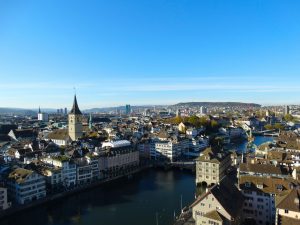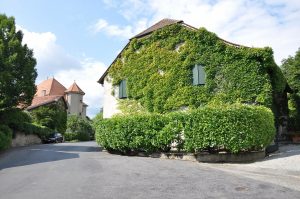The Real Estate Market in Zurich is characterized by high demand, limited supply, and significant price stability, making it one of the most expensive markets in Switzerland. As of early 2025, the market continues to show resilience and growth, driven by Zurich’s status as a major economic and cultural hub.
Price Stability and Growth: The average price per square meter for apartments in Zurich is approximately CHF 18,698, while houses average around CHF 12,975 per square meter. The overall average price per square meter across the city is CHF 15,836.
In recent years, property prices have seen a consistent upward trend, with a notable increase of nearly 100% over the last two decades. In 2024 alone, prices for detached houses rose significantly, with an average price reaching CHF 2.7 million.
Demand Dynamics: The demand for real estate in Zurich remains robust due to its economic stability and quality of life. The residential property transactions rose by about 5% in 2024, indicating a healthy market activity despite rising prices.
This uptick can be attributed to both an increase in available properties and buyers’ urgency to invest before prices escalate further.
Luxury Segment: The luxury real estate market is thriving, with penthouses averaging around CHF 5 million. High-end properties often feature premium amenities and are located in desirable neighborhoods, contributing to their elevated prices.
Key Factors Influencing the Market
- Economic Stability: Zurich’s economy is strong, supported by a diverse range of industries including finance, technology, and pharmaceuticals. This economic foundation attracts both local and international buyers.
- Limited Supply: The availability of land for new developments is restricted, leading to increased competition for existing properties. This scarcity drives up prices as demand continues to outpace supply.
- Urbanization Trends: More residents are moving to suburban areas surrounding Zurich due to affordability and accessibility. Communities like Kilchberg and Winterthur are becoming increasingly popular as they offer good transport links to the city while providing more spacious living options.
- Sustainability Focus: There is a growing emphasis on sustainable construction practices and energy-efficient buildings. New projects are increasingly incorporating green technologies and materials, reflecting broader environmental trends that influence buyer preferences.
Looking ahead into 2025, the Real Estate Market in Zurich is expected to maintain its upward trajectory:
- Price Predictions: Average prices for detached houses are projected to stabilize around CHF 2.5 million by 2025. The overall market is anticipated to continue growing at an annual rate of about 3.7%, reflecting ongoing demand amidst limited supply.
- Construction Developments: To address housing shortages, there are plans for more construction projects focusing on inner-city densification and vertical building solutions. This approach aims to optimize land use while accommodating the increasing population density.
Zurich’s real estate market remains a vibrant sector characterized by high demand and limited supply, leading to significant price stability and growth. As urbanization continues and sustainability becomes a priority, the dynamics of this market will evolve but are likely to remain strong in the foreseeable future.
Factors Driving High Demand for Real Estate in Zurich
The real estate market in Zurich is experiencing significant demand, influenced by a combination of economic, demographic, and social factors. Here are the key drivers:
1. Economic Prosperity
- High-Income Employment Opportunities: Zurich is a major economic hub in Switzerland, attracting multinational corporations and high-paying jobs. Companies like Google and UBS offer competitive salaries, which significantly exceeds the local minimum wage. This influx of well-compensated professionals has heightened demand for upscale residential properties, as these individuals seek housing that matches their lifestyle and income levels.
- Stable Economic Environment: The Swiss economy is known for its stability, low unemployment rates, and favorable business conditions. This stability attracts both local and international investors, further driving demand for real estate.
2. Favorable Tax Environment
- Tax Incentives: Zurich benefits from relatively low tax rates compared to other major cities globally. This tax attractiveness draws high-net-worth individuals and businesses looking to invest in property, thereby increasing competition and prices in the real estate market.
3. Low Interest Rates
- Affordability of Financing: The prevailing low-interest-rate environment in Switzerland makes it easier for buyers to finance property purchases. With mortgage rates below 3%, many buyers are encouraged to enter the market, contributing to increased demand.
4. Limited Supply of Properties
- Geographical Constraints and Zoning Regulations: Zurich’s geography and strict zoning laws limit new construction, resulting in a scarcity of available housing. This limited supply combined with rising demand creates intense competition for properties, driving prices upward.
- Low Vacancy Rates: The vacancy rate for residential properties in Zurich is currently below 1%. This extremely low availability indicates a highly competitive market where potential buyers often face challenges finding suitable homes.
5. Demographic Trends
- Population Growth and Migration: Continued high net immigration into Zurich has led to population growth, with over 58,000 new residents recorded between January and September 2024. This influx increases the demand for housing as more people seek living spaces in the city.
- Changing Household Dynamics: As household formation rises—particularly among young professionals and families—there is an increased need for diverse housing options, further intensifying demand in the market.
6. Quality of Life
- Attractive Living Conditions: Zurich offers an exceptional quality of life characterized by excellent public services, healthcare, education systems, and recreational opportunities. The city’s reputation for safety and cleanliness makes it a desirable location for both domestic and international residents.
- Lifestyle Preferences: Areas with scenic views or proximity to Lake Zurich are particularly sought after, as they offer a desirable lifestyle that many buyers are willing to pay a premium for.
In short, the high demand for real estate in Zurich is driven by a confluence of economic prosperity, favorable tax conditions, low interest rates, limited property supply, demographic changes, and an attractive quality of life.
These factors create a dynamic market environment that continues to evolve as Zurich maintains its status as one of Europe’s leading cities for real estate investment.
Residential vs. Commercial Real Estate in Zurich
The real estate market in Zurich encompasses both residential and commercial sectors, each with distinct characteristics, demand drivers, and investment opportunities. Understanding the differences between these two segments is essential for potential investors and stakeholders.
Residential Real Estate
- High Demand and Rising Prices: The residential market in Zurich is characterized by strong demand driven by limited supply and continuous population growth. Property prices have surged, with average prices for apartments ranging from CHF 7,000 to CHF 25,000 per square meter. Detached houses can reach prices as high as CHF 35,000 per square meter in prime locations.
- Low Vacancy Rates: The rental market is experiencing low vacancy rates, currently around 3.8%, which has resulted in a significant increase in rental prices—up by 6.3% year-over-year as of mid-2024. This scarcity of available properties further fuels demand for residential real estate.
- Investment Appeal: Investors view residential properties as a safe investment due to their stability and consistent appreciation over time. The residential sector is often preferred for its high earnings security compared to commercial properties, which can be more volatile.
- Sustainability Trends: There is a growing focus on energy-efficient and sustainable housing developments, which are increasingly attractive to buyers and investors alike. Properties that meet modern energy standards are seeing heightened interest, reflecting a shift towards environmentally conscious living.
Commercial Real Estate
- Market Dynamics: The commercial real estate sector in Zurich has faced challenges, particularly in retail and office spaces, influenced by rising interest rates and changing work patterns due to hybrid work models. While prime office spaces still command high rents due to demand for modern facilities, secondary properties struggle with higher vacancy rates.
- Investment Yields: Commercial properties generally offer higher average rental yields (around 5.2%) compared to residential properties (approximately 4.1%). However, the perceived risk associated with commercial investments can deter some investors, leading to a preference for residential assets despite potentially higher returns from commercial properties.
- Evolving Demand: The demand for commercial spaces is shifting towards high-quality, sustainable buildings that meet modern standards. Logistics and industrial properties are gaining traction due to the rise of e-commerce and supply chain demands, indicating a diversification within the commercial sector.
- Long-Term Stability: Despite current challenges, the commercial real estate market in Zurich is expected to maintain stability with moderate growth projections. Investors are increasingly focusing on logistics properties and modern office spaces that align with sustainability goals.
Comparative Summary
| Feature | Residential Real Estate | Commercial Real Estate |
| Price Trends | High demand; prices rising consistently | Mixed; prime locations stable, others declining |
| Vacancy Rates | Low (around 3.8%) | Moderate; higher in secondary locations |
| Investment Yield | Lower yields (~4.1%) | Higher yields (~5.2%) |
| Market Drivers | Population growth; limited supply | E-commerce growth; demand for quality spaces |
| Sustainability Focus | Strong emphasis on energy efficiency | Increasing focus on sustainable buildings |
Both residential and commercial real estate markets in Zurich present unique opportunities and challenges. While the residential sector thrives on high demand and stable appreciation, the commercial sector is navigating changes influenced by economic factors and evolving tenant needs. Investors must carefully consider these dynamics when making decisions in Zurich’s real estate landscape.
Current Market Trends in Zurich (February 2025)
As of early 2025, the real estate market in Zurich is characterized by several key trends that reflect the interplay of economic conditions, demographic shifts, and evolving buyer preferences. Here are the notable trends shaping the market:
1. Rising Property Prices
- Detached Houses and Apartments: The average price for detached houses in Zurich is projected to stabilize around CHF 2.5 million in 2025, following a significant increase of 35% since 2018. For apartments, the average price per square meter is approximately CHF 15,633, reflecting a steady upward trend in residential property prices.
- Luxury Market Growth: The luxury segment continues to thrive, with penthouses averaging CHF 5 million. This growth is driven by high demand for premium properties featuring modern amenities and desirable locations.
2. Increased Transaction Activity
- Residential Transactions: In 2024, residential property transactions rose by 5%, indicating a robust market despite rising prices. This uptick can be attributed to buyers acting quickly to secure properties amid fears of further price increases.
- Market Dynamics: Although overall transaction volumes have seen fluctuations, the increase in listings (up by 10.8% from January to April 2024) has provided buyers with more options, contributing to heightened activity levels.
3. Limited Supply and High Demand
- Low Vacancy Rates: The vacancy rate for residential properties remains low at around 3.8%, exacerbating competition among buyers and driving prices higher. The limited availability of land for new developments continues to constrain supply, reinforcing the upward pressure on prices.
- Urban Migration Trends: As housing scarcity increases in central Zurich, there is a noticeable trend of residents moving to suburban areas like Kilchberg and Winterthur, where properties are more affordable yet still offer good access to the city.
4. Economic Influences
- Interest Rates: The current low-interest-rate environment is expected to persist, making mortgage financing more accessible and attractive. This trend is likely to sustain demand for residential properties as buyers take advantage of favorable borrowing conditions.
- Economic Stability: Zurich’s status as a financial hub continues to attract both local and international investors, bolstering demand for real estate across various segments.
5. Sustainability Focus
- Green Building Trends: There is an increasing emphasis on sustainable construction practices and energy-efficient buildings. New developments are increasingly incorporating environmentally friendly technologies, reflecting a broader shift toward sustainability in real estate preferences.
The Zurich real estate market in early 2025 is marked by rising property prices, increased transaction activity, limited supply amidst high demand, favorable economic conditions, and a growing focus on sustainability. These trends collectively indicate a dynamic market landscape that remains attractive for both buyers and investors.
Future of Real Estate Market in Zurich
As we look toward the future of the real estate market in Zurich, several trends and factors are expected to shape its landscape in 2025 and beyond. These trends reflect the interplay of economic conditions, demographic shifts, and evolving buyer preferences, creating both opportunities and challenges for investors and homeowners.
1. Continued Demand for Residential Properties
- Strong Market Fundamentals: The demand for residential real estate is projected to remain robust due to ongoing population growth and a stable economy. Zurich’s population has been steadily increasing, with approximately 11,810 new residents added last year. This influx is primarily driven by the city’s thriving financial sector, which attracts talent from around the globe.
- Rising Property Prices: Residential property prices are expected to continue their upward trajectory. Over the past decade, prices have increased significantly due to limited land availability and high demand. Forecasts suggest that prices will rise by about 3.7% annually through 2025, particularly for single-family homes and apartments in desirable locations.
- Low Vacancy Rates: The rental market will likely remain tight, with vacancy rates hovering around 0.58%. This scarcity of available rental properties is expected to drive rents higher, making it increasingly challenging for renters to find affordable options.
2. Shift Towards Suburban Living
- Improved Public Transport: Enhancements in public transportation infrastructure are making suburban areas more accessible and desirable. The Network Development Strategy 2040 aims to expand tram lines and bus routes, significantly reducing commute times. As a result, property values in the outskirts are rising as more residents seek larger living spaces away from the city center.
- Lifestyle Changes: The trend of remote work has led many individuals to prioritize comfortable living spaces with access to nature. Buyers are increasingly looking for homes that offer outdoor space and a better quality of life, further driving demand in suburban areas.
3. Sustainability and Green Building Practices
- Focus on Eco-Friendly Developments: There is a growing emphasis on sustainability within Zurich’s real estate market. New developments are increasingly incorporating energy-efficient technologies and eco-friendly materials. Properties that meet green building standards are likely to see higher resale values and attract environmentally conscious tenants.
- Regulatory Support: The Swiss government is actively promoting sustainable practices in construction and urban planning, aligning with broader global trends towards greener living environments.
4. Commercial Real Estate Challenges
- Mixed Performance: While the residential sector shows strong growth prospects, the commercial real estate market faces challenges due to changing work patterns and rising interest rates. Office spaces may experience moderate growth, but secondary properties could struggle with higher vacancy rates as companies adapt to hybrid work models.
- Logistics Demand: Conversely, the industrial real estate sector is expected to grow moderately due to increasing demand for logistics and warehousing facilities driven by e-commerce growth. This sector presents opportunities for investors looking for stable returns amidst a shifting commercial landscape.
5. Investment Opportunities
- Attractive Asset Class: With falling mortgage rates making homeownership more appealing compared to renting, real estate is becoming an increasingly attractive asset class for investors. The combination of rising property values and stable rental yields positions Zurich’s real estate market as a favorable investment option.
- New Housing Projects: An influx of new housing developments—approximately 39,000 new homes projected by 2025—aims to alleviate some supply constraints in the market. While construction activity has been slow, these new projects could help stabilize prices over time.
In summary, the future of real estate in Zurich is poised for continued growth driven by strong demand for residential properties, suburban migration trends, a focus on sustainability, and evolving commercial dynamics.
While challenges remain—particularly in the commercial sector—the overall outlook suggests a vibrant market with ample opportunities for investors and homeowners alike.




